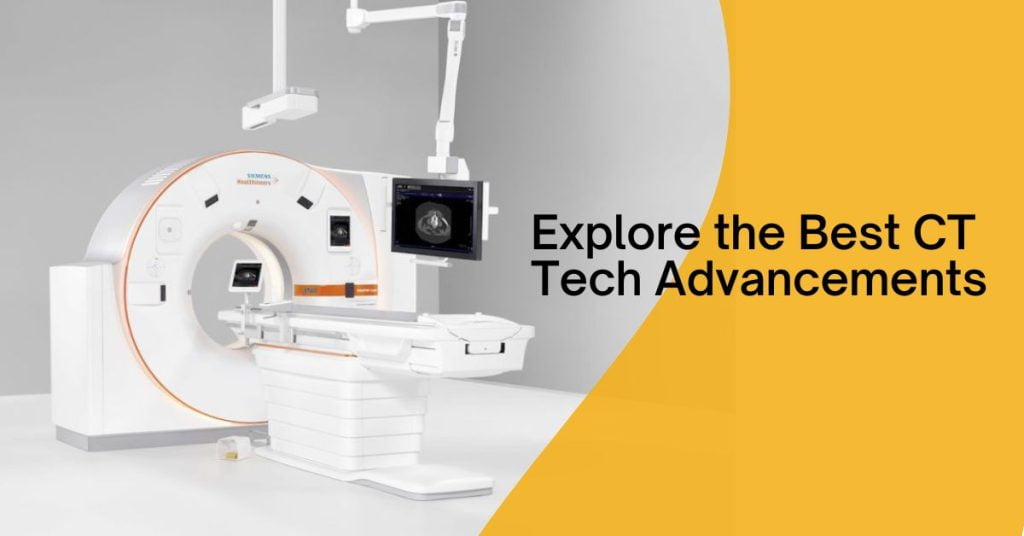Explore the cutting-edge world of CT tech advancements, from AI integration to dual-energy and adaptive imaging. Discover how these innovations are revolutionizing medical diagnostics, offering clearer images, reduced radiation exposure, and personalized patient care.
In the realm of medical diagnostics, Computed Tomography, commonly known as CT scanning or CT imaging, has revolutionized the way we visualize the human body. The advancements in CT technology have paved the way for unparalleled insights into the inner workings of our anatomy. In this comprehensive guide, we embark on a journey to explore the best CT tech advancements, their significance in healthcare, and how they are reshaping patient care. From improved image quality to reduced radiation exposure, this guide will provide an in-depth look at the latest innovations in CT technology.
Unveiling CT Tech Advancements: Where Precision Meets Imaging
CT technology has come a long way since its inception, and its evolution continues to astonish the medical community. With the integration of cutting-edge technologies, CT scanners are now capable of producing images with unprecedented clarity and detail. These advancements have opened new avenues for accurate diagnosis, treatment planning, and monitoring of various medical conditions.
The Role of AI in CT Imaging
Artificial Intelligence (AI) is playing a pivotal role in the advancement of CT technology. Machine learning algorithms are being employed to enhance image quality, reduce artifacts, and optimize scanning protocols. AI-powered image reconstruction algorithms are capable of producing high-resolution images while minimizing radiation dose—a crucial aspect in patient safety.
Read more about How AI Is Revolutionizing Health Care?
Dual-Energy CT: Beyond Conventional Imaging
Dual-Energy CT technology has ushered in a new era of diagnostic imaging. By capturing images at multiple energy levels, this technology provides insights into tissue composition and material density. This capability proves invaluable in differentiating various tissues, identifying contrast agents, and enhancing the accuracy of diagnoses.
Spectral CT: Capturing the Spectrum of Information
Spectral CT takes imaging to a whole new level by capturing the energy spectrum of X-ray photons. This technology enables differentiation of materials with similar densities, offering a comprehensive view of tissues and structures. Radiologists can extract quantitative data from the spectral images, leading to enhanced diagnostic accuracy and personalized treatment plans.
Reducing Radiation with Iterative Reconstruction
Patient safety is a paramount concern in medical imaging. Iterative reconstruction techniques are making waves in the CT field by significantly reducing radiation exposure while maintaining image quality. These algorithms refine the raw data acquired during scanning, resulting in clearer images at lower radiation doses.
Personalized Imaging with Adaptive CT
No two patients are alike, and adaptive CT technology recognizes this fact. By adjusting scanning parameters in real-time based on patient anatomy and condition, adaptive CT ensures optimal image quality while minimizing radiation dose. This personalized approach enhances diagnostic accuracy while prioritizing patient well-being.
Frequently Asked Questions About CT Tech Advancements
1. How do CT tech advancements benefit patients? CT tech advancements offer clearer images, reduced radiation exposure, and improved diagnostic accuracy, leading to better patient outcomes and treatment planning.
2. Is AI used in all CT scans? AI is increasingly being integrated into CT scanners to optimize image quality, reduce radiation doses, and enhance diagnostic capabilities. However, its implementation may vary based on the scanner model and facility.
3. What is the significance of dual-energy CT? Dual-energy CT enables better tissue characterization and differentiation, leading to improved detection of abnormalities and accurate diagnosis of medical conditions.
4. Are these advancements available in all healthcare facilities? While these advancements are becoming more widespread, their availability may vary depending on the healthcare facility’s resources and the specific CT scanner models they have.
5. How does adaptive CT benefit patients with different body types? Adaptive CT tailors scanning parameters to each patient’s unique anatomy, ensuring optimal image quality and minimizing radiation exposure, regardless of body type.
A Glimpse into the Future of CT Imaging
As technology continues to advance, so does the realm of CT imaging. The best CT tech advancements are reshaping healthcare by providing clearer, more detailed images that enable accurate diagnoses and personalized treatment plans. From AI-powered enhancements to spectral and dual-energy capabilities, these innovations underscore the commitment of the medical community to delivering the highest standard of care to patients. As we look ahead, it’s evident that CT technology will continue to evolve, uncovering new dimensions of understanding within the human body and driving the field of medical diagnostics into a future of limitless possibilities.


